Services List
Choosing the right Customer Relationship Management (CRM) software is crucial for the success of any business. In this article, we will be comparing HubSpot CRM and Zoho, two leading CRM platforms in the industry. We will delve into their features, pricing, and user experience to help you make an informed decision.

Covered in this article
In A Nutshell: HubSpot Vs Zoho
Features Comparison
Pricing Comparison
Detailed Comparison
Onboarding Experience Analysis
Zoho CRM: A Good Choice for Less Complex Use Cases
Why HubSpot CRM is Better for Scaling Businesses
How to Migrate from Zoho to HubSpot CRM
Onboarding with Velocity
In A Nutshell: HubSpot Vs Zoho
In the ever-changing CRM platform landscape, the debate frequently boils down to two big names: HubSpot and Zoho. Following our evaluation of both systems, here is our brief assessment of each: -
HubSpot provides more functionality, more robust reporting, and a more user-friendly interface, which is suitable especially in larger more complex enterprises with various departments.
-
Zoho's product is more pared-down, which may make it ideal for smaller businesses with fewer CRM requirements.
We have thoroughly evaluated the CRM, sales, marketing, and services tools in both HubSpot and Zoho, acknowledging their significant functional overlap. HubSpot's CRM is distinguished by its incorporation of workflows, automation, ticketing, operations management, and a robust CMS.
In contrast, Zoho's traditional CRM approach centers around chat, email, and workflow management, with somewhat restricted marketing and automation features. It's important to note, however, that while Zoho offers a full suite of tools, accessing these requires separate sign-ups.
Features Comparison
Let's examine the major features of HubSpot CRM and Zoho to assist you in making an informed decision that is tailored to your business needs. We hope to simplify your decision-making process by highlighting the merits and shortcomings of each platform through a thorough analysis.
| Feature | HubSpot CRM | Zoho CRM |
|---|---|---|
| User-Friendly Interface | Pros: Easy to navigate, ideal for CRM beginners. Cons: Advanced features may have a learning curve. |
Pros: Relatively intuitive and easy to learn and use. Cons: Integration and connection with other applications may be complex. |
| Email Automation | Extensive features and customisable email sequences. | Automation lets you send several emails and create a criteria-based email journey. |
| Data Analytics | Robust tools, and insightful customer behaviour analytics. | Analytics for monitoring various aspects of the sales cycle. |
| Customisation | Highly customisable with various integration options. | Pros: Highly customisable to business needs. Cons: Though easy to customise, grasping its full range of possibilities might take time, especially for highly tailored solutions. |
| User Support | Quick, 24/7 user support through chatbots and active forums | Pros: 24/7 support available depending on plan. Cons: No phone support available on free plan. |
| Use of AI | Fully integrated with its own AI system called ChatSpot. | Uses AI via its embedded AI sales assistant, Zia. |
| Training | Offers an extensive knowledge base and a free, certified academy. | Offers paid-for training. |
Pricing Structures
In this section, we delve into the subtle price structures of HubSpot and Zoho, explaining how each platform develops its pricing to adapt to a variety of business objectives.
HubSpot
HubSpot's pricing model is based on a tiered structure, offering a range from free to enterprise levels. The pricing for its various services, known as "hubs," varies depending on the specific focus of each hub:
- Sales and Service Hub: Pricing in these hubs is based on the number of seats or users, making it scalable according to the size of your sales or service team.
- Marketing Hub: Costs are primarily determined by marketing needs, such as the number of contacts you're managing.
- CRM Suite: This package includes features from the Marketing, Sales, and Service Hubs, providing a comprehensive solution. HubSpot offers this suite at a discounted rate compared to purchasing each hub individually.
- Flexibility: HubSpot allows the creation of custom bundles by mixing and matching different hubs and tiers, tailored to specific team needs.
Zoho
Zoho employs a unique approach called CRM Flex, allowing customisation of CRM licenses:
- Custom Bundling: CRM Flex allows you to pick from a selection of eight sales, marketing, and service apps. The total price of your custom bundle is the sum of the individual app prices you choose.
- Diverse Plans: Zoho offers various plans within its CRM ecosystem, catering to different business needs, including CRM, customer service, email marketing, business intelligence, social media marketing, and more.
- Pricing Tiers: Each app and service within Zoho's structure starts with a basic plan and moves up to more advanced tiers, each adding more features and capabilities.
Detailed Comparison
Reporting
HubSpot's Reporting Tools: HubSpot's reporting system is designed for ease of use and flexibility. It allows users to create custom reporting dashboards based on templates or from scratch, using a straightforward report builder. This functionality is enhanced by a user-friendly point-and-click interface and live previews, making it easier for users to visualise and analyse data effectively.
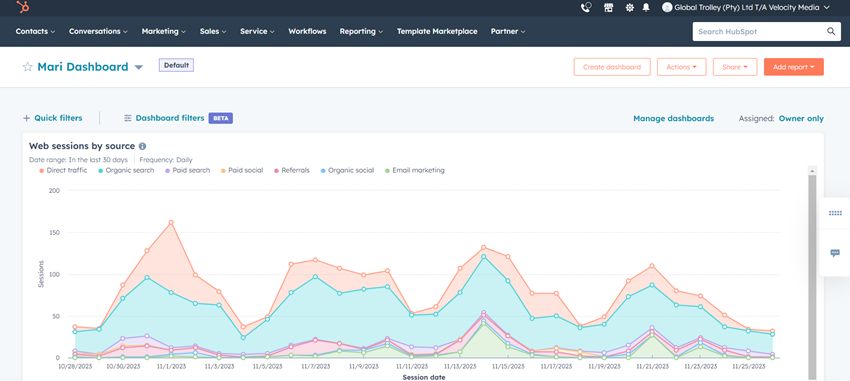
Zoho's Reporting Capabilities: Zoho offers a robust library of preset reports that cover a wide range of business needs, from sales to lead check-ins and invoices. However, creating custom reports in Zoho involves a more complex process, typically a seven-step procedure via Zoho Desk. Additionally, Zoho's Standard plan limits the number of custom reports to 50, which might restrict in-depth data analysis for larger enterprises.
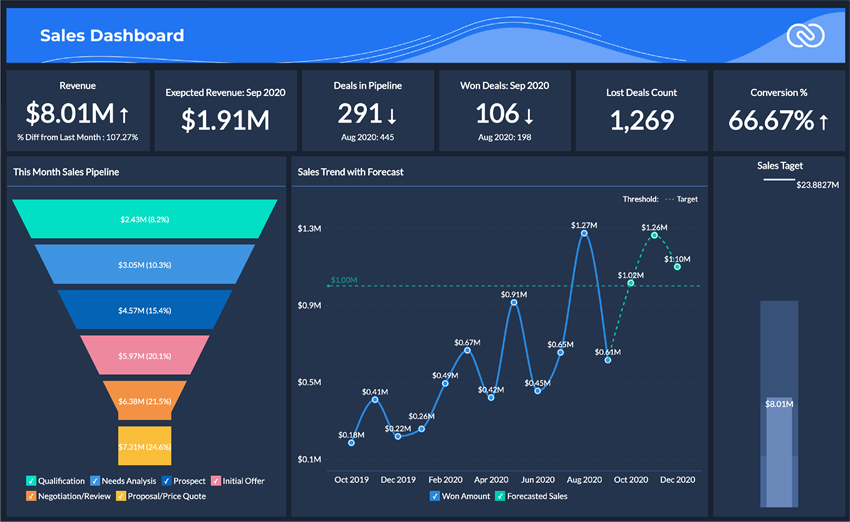
Contact and Lead Management
HubSpot's Contact and Lead Management: HubSpot's contact management platform is comprehensive, offering functionalities such as sorting, grouping, data security, format fixing, and duplicate entry management. These features provide a more enriched experience than Zoho's, especially when dealing with large volumes of contacts and leads. HubSpot's system integrates seamlessly with custom CTA campaigns and forms, both native and third-party, for efficient lead capturing.
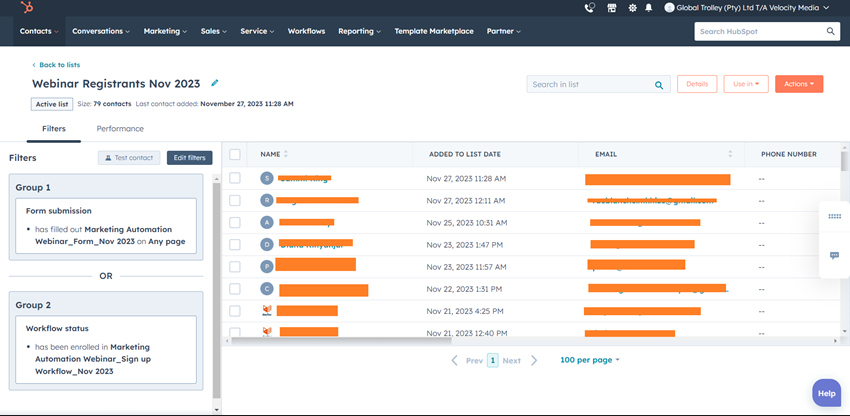
Zoho's Approach to Contact Management: Zoho's platform is known for its straightforward approach to contact and lead management. Users can easily add, import, and edit leads and contacts. Zoho's lead filtering capabilities are comprehensive, allowing for efficient organisation and management of contact information. While Zoho excels in the basic functionalities, it may not offer the same depth as HubSpot in terms of additional features and integrations, which may be useful for a larger organisation.
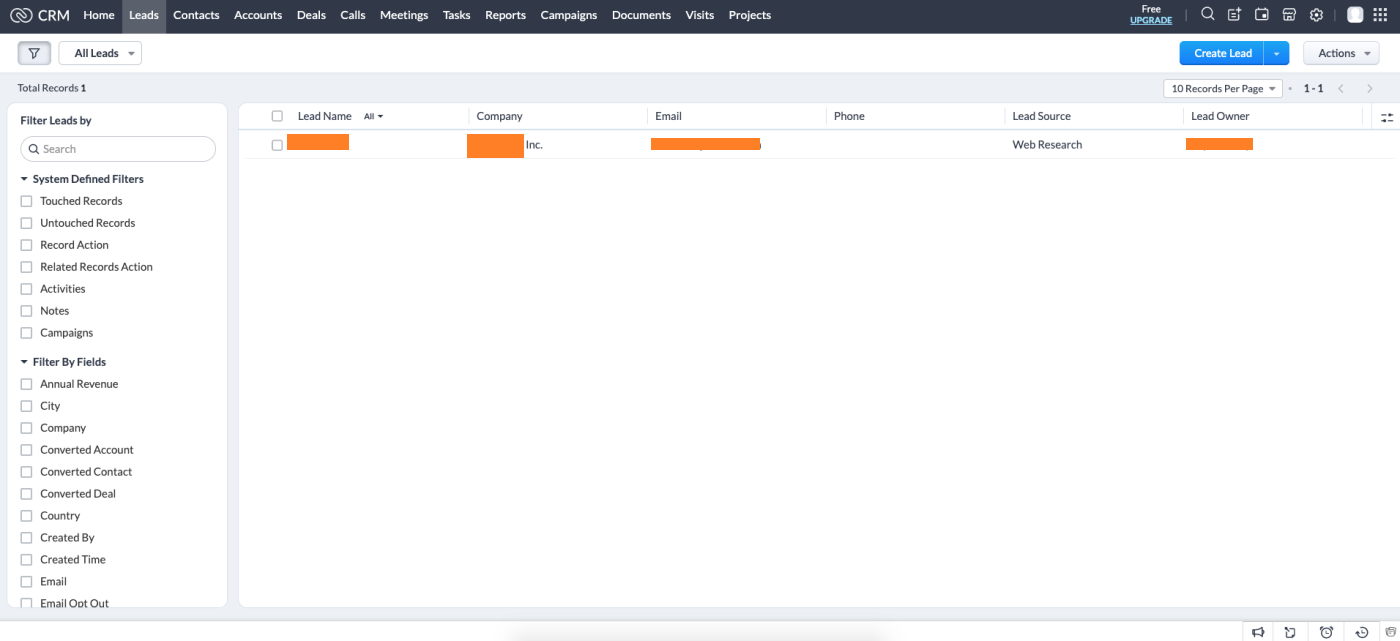
Email Capabilities
HubSpot's Email Platform: HubSpot's email platform is comparable to dedicated email software like MailChimp and Constant Contact. It simplifies the process of creating new campaigns, offering easy-to-follow funnels for different types of emails, including automated sequences and blog/RSS messages. The drag-and-drop email builder and a wide range of templates add to its user-friendliness.
Zoho's Email Functionality: Zoho's CRM is effective for basic email campaigns, allowing users to connect their inboxes directly with the software and link records logged within the CRM. While Zoho facilitates direct emailing from the dashboard and offers template creation and automation triggers, it may not be as advanced or intuitive as HubSpot's email platform, which may be more suitable for scaling enterprises.
Automation
HubSpot's Automation Features: HubSpot offers an intuitive workflow builder, which is easier to use compared to Zoho's. It allows for the creation of workflows based on various parameters like contacts, deals, and tickets, with interactive suggestions and a user-friendly pipeline. HubSpot's automation tools offer a wide array of conditions and capabilities, catering to diverse business needs.
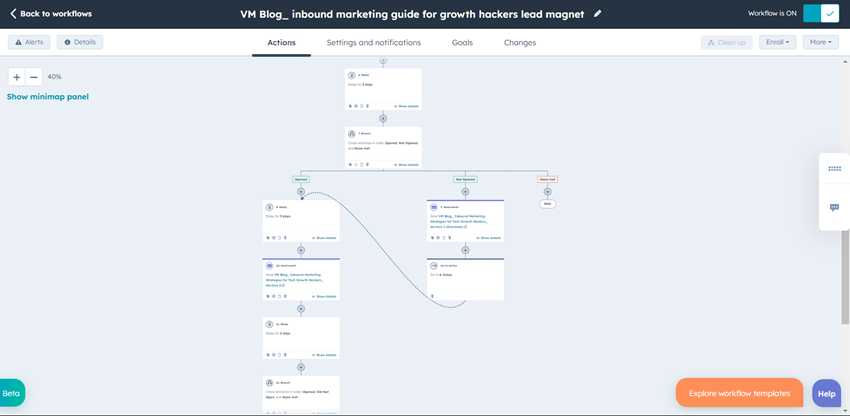
Zoho's Automation Capabilities: Although Zoho enables users to set up automated email notifications and design custom workflows, the process can be challenging due to its complex dropdown structure for creating conditions and actions. This might pose a learning curve for new users or those not familiar with such systems.
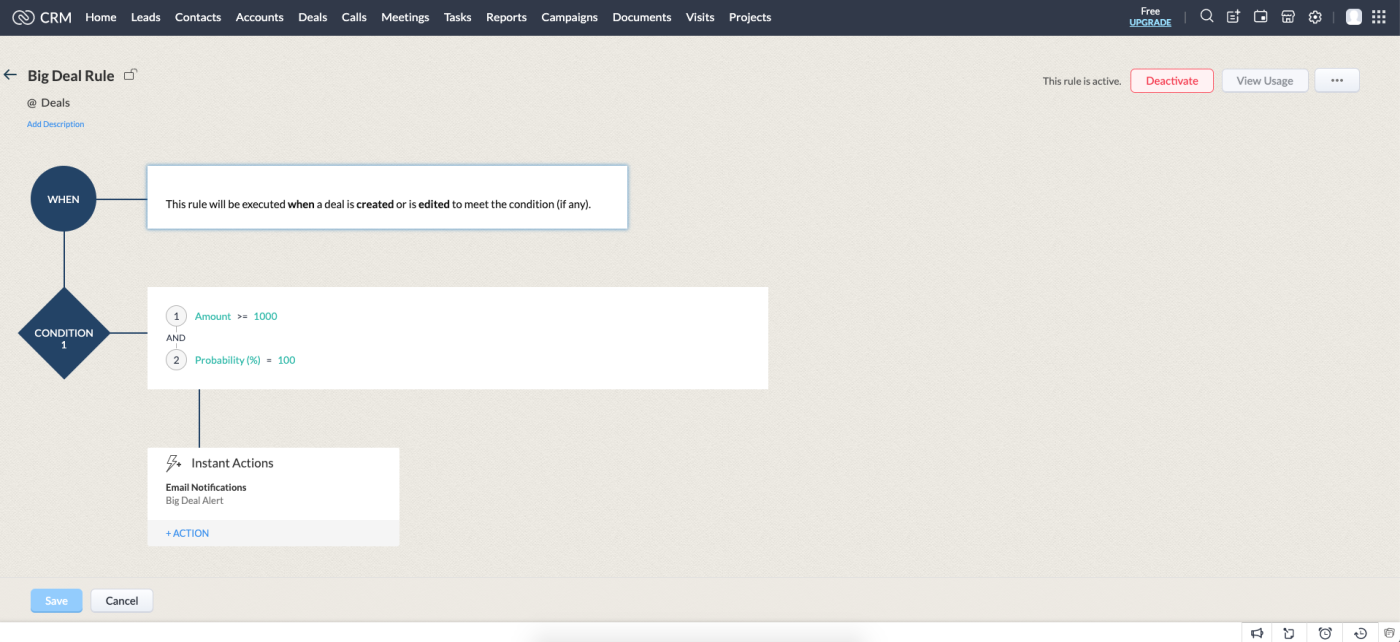
Onboarding Experience Analysis
Despite its apparent simplicity, Zoho's onboarding process can be unexpectedly time-consuming. Users often find themselves investing significant time to understand its utilities and navigation. This experience might vary for those familiar with similar platforms, but generally, it can leave new users feeling somewhat lost.
Zoho's onboarding resources are more limited. While it provides an initial overview, some YouTube guides, and seminars, these may not be adequate for all users. Many users prefer immediate hands-on experience with the software rather than attending seminars, which can be seen as an additional, often unwanted, step in the learning process.
In contrast, HubSpot offers a more intuitive user interface. New users typically find their bearings quickly, thanks to its familiar dashboard layout. Despite its complex capabilities, HubSpot's onboarding process is efficient and less frustrating.
Zoho CRM: A Good Choice for Less Complex Use Cases
Zoho CRM emerges as a suitable option for businesses with straightforward CRM needs, particularly those on a smaller scale. Its array of features, including omnichannel support, automation tools, and lead management, caters well to the basic requirements of customer relationship management, especially for small businesses.
Advantages for Small-Scale Operations
-
User-Friendly and Customisable: Zoho CRM's interface and customisable options make it accessible for those less experienced with CRM software. Its ease of use is a significant advantage for small businesses looking for a CRM solution that doesn't demand extensive training or technical know-how.
-
Effective for Basic CRM Tasks: For businesses focused on fundamental CRM tasks like lead capture, contact management, and basic automation, Zoho CRM provides ample functionality. Its integration with tools like Google Workspace and social media platforms enhances its usability for small businesses.
-
Affordable Pricing: With a pricing model that is generally lower than some of its competitors, Zoho CRM is a cost-effective choice, especially for businesses just stepping into CRM solutions.
Challenges in Scaling
While Zoho CRM is adept at handling the basic needs of small businesses, it faces limitations when it comes to scalability, which is a crucial aspect for businesses aiming for growth:
-
Lack of Advanced Features: As businesses grow, their CRM needs often become more complex. Zoho CRM, though packed with features, may not offer the advanced functionalities required by larger enterprises or rapidly growing businesses.
-
User Interface and Performance Issues: Some users have reported that Zoho CRM's interface can be less optimised for fast navigation and may involve multiple steps for certain tasks, which can be a hindrance for larger teams or more complex operations.
-
Data Management and Security: For larger businesses, efficient data management and security become paramount. While Zoho CRM provides basic security measures, its capabilities might not meet the higher demands of enterprise-level data management.
-
Customer Support Limitations: The level of customer support offered with Zoho CRM, especially in its free version (where no phone support is available), may not be adequate for the more demanding needs of larger organisations. This could be a challenge in situations requiring immediate and comprehensive support.
In essence, Zoho CRM stands out as an efficient and budget-friendly choice for small businesses with straightforward CRM needs. Its user-friendly nature and basic feature set cater well to smaller-scale operations. However, for businesses looking at long-term growth and scalability, particularly at an enterprise level, the limitations in advanced features, UI efficiency, and customer support might pose challenges. Therefore, while it's a commendable option for its targeted segment, careful consideration is required if the desired system must meet more complex, large-scale CRM requirements.
Why HubSpot CRM is Better for Scaling Businesses
HubSpot CRM is renowned for its user-friendly interface, making it a haven for individuals devoid of coding or programming skills. This accessible platform is laden with advanced automation and robust analytics tools, ensuring an unmatched user experience. Unlike Zoho, a cheaper yet less feature-rich alternative, HubSpot stands out with its streamlined user experience and a plethora of functionalities aimed at bolstering your business operations. Key highlights include:
- Ease of Use: No technical expertise is required.
- Advanced Automation: Streamlining various business processes.
- Powerful Analytics: Providing insightful data for informed decisions.
Additionally, HubSpot goes the extra mile with the free HubSpot Academy, an invaluable resource for users to delve deeper into the CRM tool, enhancing their knowledge and utilisation of the platform. This initiative underscores HubSpot's unwavering commitment to user education and empowerment.
The ongoing support and substantial training resources further elevate HubSpot CRM's stature. The HubSpot Academy, open to all, alongside remarkable automation and analytics capabilities, morphs HubSpot CRM into more than just software—it becomes a comprehensive solution for organisations aiming to refine their customer engagements and simplify operations. It's a user-centric platform, designed to make the CRM journey enjoyable and beneficial for businesses of all sizes, catering to individuals with varied levels of technical proficiency. HubSpot CRM is not just a tool, but a partner in fostering meaningful customer relationships and achieving business excellence.
How to Migrate from Zoho to HubSpot CRM
Transitioning from one CRM system to another can seem like a daunting task. However, with the right approach and guidance, the process can be smooth and hassle-free. Here's how you can make the switch from Zoho to HubSpot CRM:
Data Backup
Before making any changes, it's crucial to back up all your existing data in Zoho. Failing to back up your data could result in the loss of important customer information.
Data Mapping
Identify the data fields in Zoho that correspond to those in HubSpot CRM. This will ensure a seamless data transfer. Incorrect mapping can lead to data inconsistencies.
Data Import
HubSpot CRM offers straightforward data import options, allowing you to easily upload your Zoho data. Ensure that the data is clean and well-structured to avoid any import errors.
Testing
Once the data is imported, perform tests to ensure that all information has been transferred correctly. Skipping this step can lead to operational issues later on.
Training and Onboarding
Train your team on how to use HubSpot CRM effectively. Velocity offers comprehensive training sessions as part of our service package. Inadequate training can result in inefficient use of the new system.Onboarding With Velocity
As a Platinum HubSpot Partner, Velocity is well-equipped to help you make the most of your HubSpot CRM experience. Our team of experts can guide you through the setup process, customise the platform to suit your business needs and provide ongoing support to ensure you get the maximum ROI from your CRM investment.
Both HubSpot CRM and Zoho offer valuable features for businesses looking to improve their customer relationship management. However, HubSpot CRM offers a more streamlined, user-friendly experience with advanced features that are worth the investment.
Are you poised to elevate your CRM strategy and drive your business growth? With HubSpot's advanced, scalable solutions, you're not just choosing a CRM; you're embracing a transformative business tool. Let Velocity be your guide in unlocking the full potential of HubSpot CRM. Our expertise lies in customising solutions to fit your unique growth trajectory. Don't let limitations hold you back. Contact Velocity now, and let's chart your path to unparalleled success with HubSpot CRM. Your future-proof CRM solution awaits.






